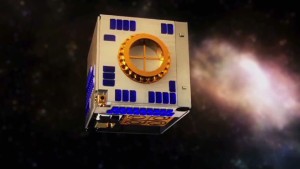My father grew up about two hours east of Calcutta. I remember him
telling me that on a number of occasions, and at the behest of his
father, he would read the dictionary by the light of a hurricane lamp.
 Tiny cubes will beam internet from space?
Tiny cubes will beam internet from space?
Not only was there little else to read in English, but once the sun set, light also became a luxury.
Outernet
founder Syed Karim explains his plan to get information from the web to
the half of humanity that currently lacks access to it at TEDGlobal
2014.
JAMES DUNCAN DAVIDSON/TED
It was rural East
Pakistan in the 1950s. His middle class upbringing couldn't compensate
for the lack of municipal infrastructure; no power lines, no paved
roads, and definitely no public library.
Instead, his connection
to the outside world was limited to one or two new books a year,
imported from London, and whatever news and information came through the
shortwave radio that he built with strands of copper and a crystal
diode.
After innumerable nights
reading the prose of Merriam Webster, my father eventually emigrated to
the United States to become a successful engineer with numerous patents
to his name.
My childhood in the
suburbs of Chicago was a completely different experience -- it was
filled with television, after-school programs and hours of meandering
around the local public library.
Information abundance has had a lasting impact on my interests, my education, and my ambition.
After years of studying
the subject, both formally as a graduate student and informally as an
entrepreneur, there is little doubt that increasing information access
leads to a direct increase in quality of life.
But the problem is not in acquiring a wealth of information, the problem is in distributing it.
There is little doubt that increasing information access leads to a direct increase in quality of life.
Syed Karim
Syed Karim
The internet is a very
effective means of distribution. The problem, however, is that over four
billion people -- more than half the world's population -- lack a
connection to it.
This is a huge number and a huge problem that is not likely to be solved anytime soon.
Despite the advent of an
affordable $35 smartphone, internet access continues to be unaffordable
or unattainable for billions all over the world.
Now really think about
what that means: More than half of humanity lacks access to the news,
information and education that many of us take for granted.
As a species, we are operating at less than half of our capacity because the majority of our minds are malnourished.
But imagine if there was a way to feed a hungry mind without charging a dime?
Imagine if there was a way to provide the unconnected world with free access to the wealth of human knowledge in Wikipedia?
Imagine if we could
offer a digital information service to all of humanity, regardless of
income, infrastructure, or jurisdiction.
 Tiny cubes will beam internet from space?
Tiny cubes will beam internet from space?
Even with a 50 Mbps connection to the internet, the value of a library, whether physical or digital, has never escaped me.
It is this respect for knowledge and personal edification that led to what we refer to as "humanity's public library" -- Outernet.
Outernet is a global
broadcast data service, which gives access to information to the
billions of people whose information needs are currently not being met.
Unlike Google's balloons and Facebook's drones that aim to carry internet access for a fee, Outernet provides access to information for free.
It does this by
assembling offline versions of digital media that is normally found on
the web, like Wikipedia, Khan Academy and Project Gutenberg.
The content is then beamed down from space. The best way to think about Outernet is as a cross between FM radio and BitTorrent.
Instead of music, Outernet broadcasts digital files and instead of radio towers, we use a network of satellites.
Just before I founded
Outernet, my daughter Faraday was born. She is named after one of the
greatest scientists in history, Michael Faraday.
Born in the 18th
century, Faraday was not a son of privilege and although he received
little formal education, he was lucky enough to apprentice for a
bookbinder.
Imagine if there was a way to feed a hungry mind without charging a dime?
Syed Karim
Syed Karim
Through this fortuitous access to books, he was given a key to the foremost thinkers of his time.
He was lucky enough to
consume the kind of knowledge and information that normally existed in
only the most exclusive private libraries.
He was in the right place at the right time, and it allowed him to fundamentally change the trajectory of our species.
Stories like that of my father and Michael Faraday have run their course and no longer need to exist.
They belong in history books that, along with thousands of other books, can now be read by anyone in the world, for free
No comments:
Post a Comment